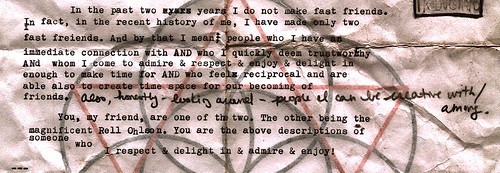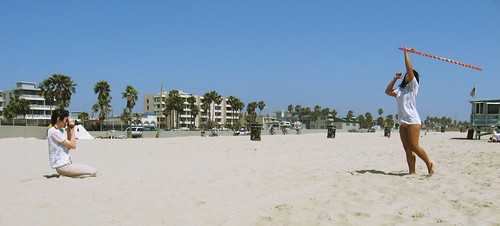This is from Reverse XRays' blog.
Underground venues, punks vs. art-rockers, midget keyboardists?
There was a time when I could keep track of the underground venues in town,such as warehouses, galleries, and various DIY show-spaces, but nowadays there are so many, with new ones popping up rather often. Independent artistic culture gives me that feeling of inspiration when I visit one of these places where folks are making their dreams happen now. A few years back some architecture students from the university opened up a well-received space called the Green Door in an East Side industrial zone, and while the residents lacked basic amenities and comforts, the guests could shimmy and cavort on raised platforms framed by painted silvery surfaces. Alas, these wonderful micro-worlds generally last for but a season, yet much excitement prevails in the meantime.
Early on, some of us in Reverse X Rays let it be known that underground-type spaces (rather than the downtown clubs) were where we preferred to play. After the record and tour, interest in our performances has grown apace, and as a practical matter a show with more than 50 or 60 people may require an official venue, and we are happy to play those nightclubs that display honesty and ethics in their dealings with artists. Nowadays we can fill up a higher-profile space like Club Deville, but to me, what is more inspiring is a DIY space some kids put together out of love for music and good times with friends.
Perhaps because of our admiration for this kind of underground culture, we got booked in a punk warehouse space: a bit of an odd match for RXR. Now, for some background, I must mention my interest in an undeservedly obscure part of 1970's music history: punk-rockers vs. art rockers! What perhaps began as a disappointment with not getting a decent view of the stage at a 20,000 person Yes or Moody Blues concert turned into a insouciant, spiky-haired backlash against muso technique borrowing classical bits, mysterioso cosmic lyrics, and expensive synthesizers. This reaction is understandable: these jet-set prog-rockers really had gone too far into pomp-rock, what with Keith Emerson of Emerson, Lake and Palmer playing a grand piano suspended from a crane, Rick Wakeman of Yes (and David Bowie’s “Changes” and “Space Oddity”) dressed up in wizard robes (http://www.huxrecords.co,/bio15.htm), playing keyboards while sundry knights staged a sword-battle as they skated about an ice rink. Such spectacle was an unfortunate sign that prog was morphing into a bloated variant of arena-rock. After the initial burst of genuine progressivism roughly '68-'73, fewer good songs appeared from the prog wing of art-rock. A ponderous, would-be magnum opus LP often contained longer and longer pieces, with songwriting prowess giving way to mathlete* muscle or jazzy noodling, while the live shows relied on flash and spectacle (or laser displays!) to stimulate the baked brains of the throngs of not-so young youth. Something was going to challenge this dense, largely undanceable music, so overly reliant on technical sophistication and complexity.
There was a period where what is now called "zolo" emerged around 1974 as a post-prog, new direction in art-music, with artists such as Tin Huey or Pere Ubu showing a danceable, less technically complex approach that was still quite imaginative. Certain tracks of the Brian Eno records of the '73-'74 era and Robert Fripp's League of Gentlemen, virtually all of the '76-79 era Taking Heads, as well as bands like ESG, were likewise economical/arty/funky/novel. There was a focus on songs that were much more to the point, with no need for prog-rock elaborate theatricality or cryptic lyrics about elves or starships. These and other new bands could more-or-less fit in with the early punk (at first a movement, not a genre) and new wave. But after an initial premise of radical creativity and innovation, in the UK and then the US, the kids needing to do their own thing regressed to a back-to-basics aesethtic: cliched bad boys with tough guitars in leather jackets, etc, and the critics sided with these brash upstarts. Unsurprisingly, Talking Heads later fretted about being labeled "art rock", but that was their own fault, as they had Adrian Belew, a member of King Crimson, playing with the band! For that matter, various punk rockers, from Sid Vicious, to some of Bad Brains, had influences from progressive rock (as it turned out, punk over the decades increasingly became a mohawked parody of itself, turning the original streetwise freak-boom that demanded total artistic freedom into artless formulaic aping of early anti-heroes by antisocial malingerers on the dole and on the syringe, 1,257 '80's hardcore outfits ranting against Ronald Reagan, and in recent years, radio-friendly boy-bands providing the soundtrack for confused alt-mallrat youth "rebellion" at chains like Hot Topic)
Now RXR are not a prog band, but as I was preparing for the show at a punk venue, I certainly did want to look as un-punk as feasible, so I selected striped trousers and a dark blue suitcoat. Time to represent the art-rockers in the 512! While I do actually like some some early punk, such as the Fall and the Clash (though I personally think the Sex Pistols are almost as overrated as Madonna) I thought it more entertaining to dress fancy-style, as if I were invited to a midnight tea party in a garden with handsome lady professors, cellos, and miniature cakes. I also remember Kate Pierson of the B-52's talking of their early days in Athens Georgia, and how they would wildly over-dress for the parties they went to, resulting in raised eyebrows.
As it turned out, I got no more than the odd quizzical glances from the subcultural denizens at the warehouse we played the show at. I did ask a gentleman with a facial tattoo about his opinions about implanting microprocessors into the brain, but was unable to get much going there. Maybe the connections between Jack Ruby and Hank Williams Sr. would have been a better icebreaker? Later I went around afterwards loudly announcing “has anyone seen our little green flute?” (which was, in fact, missing) noone reacted with disdain or sarcasm. Perhaps the speedy tempos, gong, and car-horn sax had won them over?
The highlight of the night: a blotto time-traveler* who was evidently a 9-string guitarist and ex-prodigy, informed me that Reverse X Rays "need a keyboard-playing midget" in the band. The more I think about it...the more interested I become. Any takers?
O
* -"mathlete"-originally meaning braniac math student, here referring to highly technically skilled musician
* -“time-traveller”-someone who was around in much earlier
periods of the pop-scene, such as the new-wave 1970’s









1 comment:
[url=http://discounts24.co.uk/]replica panerai[/url]
replica watches
genuine rolex yachtmaster
breitling replica watch reviews
gucci handbags
high quality rolex replicas
http://discounts24.co.uk/
Post a Comment